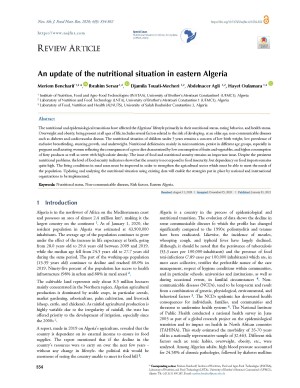An update of the nutritional situation in eastern Algeria
Abstract
The nutritional and epidemiological transitions have changed the way of life for Algerians. It is observed in their nutritional status, eating behavior, and health status. Overweight and obesity are present at all ages of life. This complex problem includes many factors related to the risk of developing, at an older age, non-communicable diseases such as diabetes and cardiovascular disease. The nutritional situation of children under 5 years remains a concern of low birth weight, low prevalence of exclusive breastfeeding, stunting growth, and underweight. Nutritional deficiencies, mainly in micronutrients, persist in different age groups especially in pregnant and lactating women reflecting the consequences of a poor diet characterized by low consumption of fruits and vegetables, and higher consumption of fatty products as well as sweet having high energy density. The issue of food and nutritional security remains an important issue. Despite the persistent nutritional problems, the level of food security indicators show that the country is not exposed to food insecurity, but dependency on food imports remains quite high. The living conditions in rural areas must be improved in order to strengthen the agricultural sector which must be able to meet the needs of the population. Updating and analyzing the nutritional situation using existing data will enable the strategies put in place by national and international organizations to be implemented.
Full text article
Authors
Copyright (c) 2020 Authors

This work is licensed under a Creative Commons Attribution 4.0 International License.
-
Attribution — You must give appropriate credit, provide a link to the license, and indicate if changes were made. You may do so in any reasonable manner, but not in any way that suggests the licensor endorses you or your use.
-
No additional restrictions — You may not apply legal terms or technological measures that legally restrict others from doing anything the license permits.





